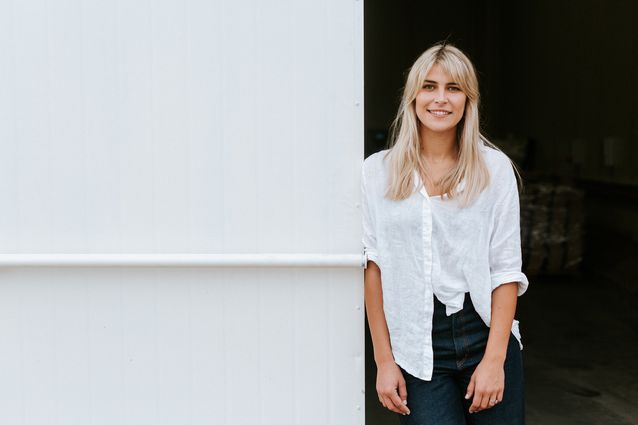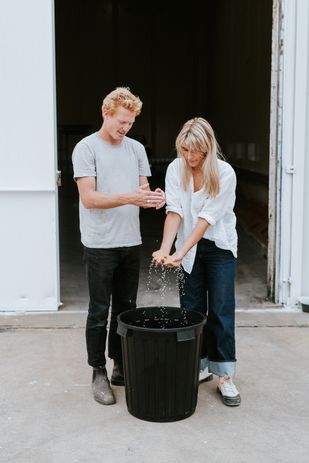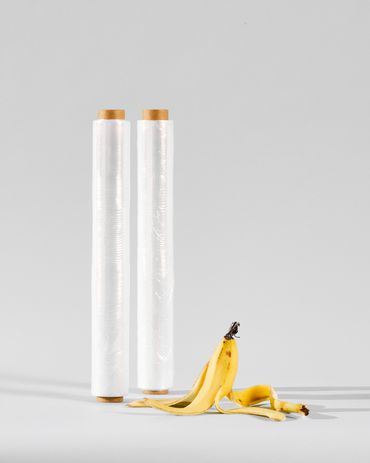Julia Kay is proud to be material obsessed. As an architect, she said, “The thing that I was really excited about was the sustainability of all the materials that I was using and how they came together. From really early on, I remember researching where every material came from and the manufacturing processes – it was always something I was interested in.”
Kay originally studied at the University of Western Australia and worked in Cox Architecture’s Perth studio before moving to Melbourne. It was on her construction site visits that the seed was planted for a new business that has, in a few short years, grown from a fledgling start-up to the start of a global venture.
The architect and her husband Jordy, a winemaker, are on mission to rid the world of plastic cling wrap. Their company, Great Wrap, makes a home compostable cling wrap made from industrial food waste, with a goal to “knock petroleum stretch wrap off the shelf!”
Julia Kay and husband Jordy founded Great Wrap which makes a bioplastic cling wrap from potato starch.
Image:
Courtesy Great Wrap
“In that journey of going to construction sites seeing all the materials that I’d obsess over wrapped in plastic, I could see there was big problem,” Kay said. “My husband was working in wine and he was also seeing an immense amount of this stuff. I just felt, the world needs some help, what can I do? Can we re-design what it’s made of?”
The couple spent a lot of free time “poring over research papers” as well as working with Monash University to develop a cost-effective formula for bioplastic material. “It was really exciting to find a research paper that had done this process using a waste material,” Kay recalled. “We also did some research around the availability of waste products in Australia because we didn’t want to design a process and then not be able to find a way to commercialise it.”
Great Wrap is made from potato starch, sourced from waste product left over from commercial chip making. “Currently the waste we take [would otherwise] just go into a paddock to rot and emit methane or be fed to pigs and cows,” Kay explained. “It goes through a few chemical processes and leaves you with a material that can be turned into a polymer that acts just like plastic. But because it’s come from a natural material like a potato, it breaks down a lot easier than a petroleum-based plastic and it’s a lot less extractive in the way you get to it.”
Great Wrap is home compostable.
Image:
Shelley Horan
The first product was launched in 2019: a compostable plastic wrap for shipping pallets. “I put together the website after work one day and we put a few posts up on Instagram, and within a matter of hours we had global airports reaching out, Australia’s largest wineries all putting in a few enquiries. That’s when we realised, this product is going to work,” Kay said.
With the demand for their pallet wrap, the business was able to secure seed funding from investors to set up their own pilot manufacturing facility in April 2020, and due to the onset of the COVID-19 pandemic, the business also quickly pivoted to making home compostable cling wrap.
“We very quickly realised that pallet wrap was going to be a hard sell in a world that had stopped,” Kay said. “We thought, everyone has a kitchen – we can make a domestic product that people can use in their homes. It was really successful because everyone was eating at home and cooking a lot more.”
From that small pilot facility that was making 1,000 rolls of cling wrap a day, Great Wrap’s demand has escalated so much that it has had to scale up its production capacity by 10,000 percent.
In July 2022, Great Wrap took over the lease of a 11,000-square-metre factory that used to make Willow eskies, which is now producing 100,000 rolls a day. The company has since secured $24 million in equity funding to help it expand overseas, first launching in the US, with hopes to also enter the European market in the near future. They are also developing a marine degradable bioplastic for their cling wrap product.
Recently, Kay worked with Melbourne-based industrial design studio Bayly Group to create a reusable dispenser.
Kay worked with Bayly Group to create a reuseable dispenser for Great Wrap.
Image:
C Hawks
“The reuseable dispenser was definitely borne out of just missing having a good sketch,” she said. “I created myself a mini brief and it was a really amazing design journey for me.”
She was also named 2022 Young Victorian of the Year by the Victoria Day Council. Great Wrap has also won a number of awards, including the 2021 Circle Award in the Home, Garden and Utilities category.
For Kay, a self-confessed “nerdy teenager” who was obsessed with architecture from the age of 14, Great Wrap results from the application of one of architects’ most valuable skills – iteratively and systematically solving a problem. She also reflects, “It’s been really helpful to have the project management skills you learn from architecture, like managing builders and engineers and talking almost multiple languages along the way to get a desired result.”
“Architecture never leaves you,” continued Kay, “and I’m really looking forward to maybe getting back to architecture when I retire or something like that. I’m hoping that if I do ever get back into architecture, that because of [Great Wrap], the clients I’ll attract will be just as interested in the environment and the materials that they’re using.”
This article is part of ArchitectureAU’s “The entrepreneurial architect” series, in which we profile architects who are trying their hand at non-architectural businesses.





